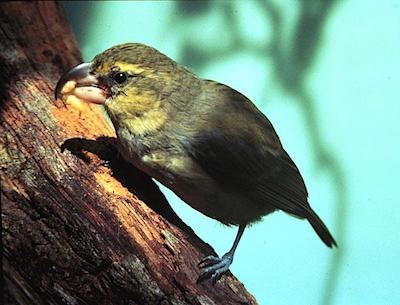Nearly $16 million has been committed by the Interior Department on a plan to prevent the extinction of Hawaiian Forest Birds found in Haleakalā and Hawai'i Volcanoes national parks and elsewhere in the state.
The funding will support a Hawaiian Forest Bird Conservation Keystone Initiative, which was unveiled as part of the Department’s Restoration and Resilience Framework. The Framework is guiding $2 billion in investments from the Bipartisan Infrastructure Law and Inflation Reduction Act to restore lands and waters and advance climate resilience. Interior Secretary Deb Haaland announced the historic funding Tuesday during remarks at the Hawai’i Conservation Conference in Honolulu.

An adult Maui parrotbill/Alan Liberman, Keauhou Bird Conservation Center via USFWS
“Hawaiian Forest Birds are a national treasure and represent an irreplaceable component of our natural heritage. Birds like the ‘I’iwi, Kiwikiu and ‘Akikiki are found nowhere else in the world and have evolved over millennia to adapt to the distinct ecosystems and habitats of the Hawaiian Islands,” said Haaland. “Thanks to President Biden’s Investing in America agenda, we are working collaboratively with the Native Hawaiian Community and our partners to protect Hawaiian Forest Birds now and for future generations.”
The Hawaiian islands once counted more than 50 species of endemic forest birds, but today there are fewer than 17 species, according to the National Park Service, some with fewer than 500 individuals left. The kiwikiu, a variety of honeycreeper also known as the Maui Parrotbill, is one of the dwindling species and is predicted to vanish from the Earth in just six years. Once abundant across Maui and Moloka'i, today fewer than 200 individuals are believed to be found across less than 8,000 acres on Maui in Haleakalā National Park, Hanawi Natural Area Reserve, and The Nature Conservancy’s Waikamoi Preserve.
Driving down the populations are an array of threats that have caused significant declines in their populations. Habitat loss, invasive species, climate change and disease, such as avian malaria spread by mosquitoes, are urgent challenges impacting bird species across the Hawaiian Islands.
You can learn more about the problem and the approach to halting avian malaria in Haleakalā in this story from the Traveler.
In December 2022, the Interior Department released a Strategy for Preventing the Extinction of Hawaiian Forest Birds. The strategy provides a shared vision among the department’s bureaus for a comprehensive approach to prevent the extinction of Hawaiian Forest Birds by applying a science-based approach, various conservation techniques, and Native Hawaiian biocultural knowledge and practices. This approach is rooted in close coordination with federal and non-federal partners to leverage resources and expertise to meet common goals.
Funding from President Biden’s Investing in America agenda offers an historic opportunity to allocate substantial resources toward the conservation efforts required to save these endangered and threatened species from the brink of extinction. Without this funding, experts assessed that two species could go extinct within the next year.
The Hawaiian Forest Bird Conservation Keystone Initiative will pursue several key objectives, including:
- Captive Care: Expanding captive care programs and facilities for bird species most at risk of imminent extinction.
- Invasive Mosquito Eradication: Implementing cutting-edge strategies to control and eradicate invasive mosquitoes that spread avian malaria, which has ravaged Hawaiian forest bird populations in recent years.
- Establish New Bird Populations Through Translocation: Relocating new populations of bird species to higher elevation refugia within the Hawaiian Islands where avian malaria is not yet present will help prevent further extinctions.
- Research and Monitoring: Conducting extensive scientific research and monitoring to ensure mosquito control efforts are effective and enhancing our knowledge on mosquito and forest bird biology. This knowledge will inform more effective conservation strategies.
- Native Hawaiian Community Engagement: Actively engaging Native Hawaiian cultural practitioners and experts through consultation, knowledge sharing, protocol and traditional practices at each major stage of a conservation action. This not only contributes to the overall forest bird recovery efforts but also sustains the Native Hawaiian Community’s biocultural relationship with the forest birds.




 Support Essential Coverage of Essential Places
Support Essential Coverage of Essential Places






